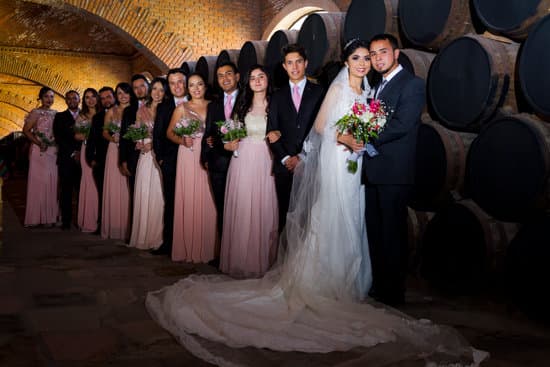Planning a wedding can be an exciting and joyous experience, but it also involves a great deal of organization and decision-making. One crucial aspect of wedding planning is estimating how many guests to expect at the event. From budgeting considerations to venue selection and safety measures in the midst of the COVID-19 pandemic, the number of anticipated attendees plays a significant role in various aspects of the planning process.
When estimating the number of wedding guests, there are several factors to consider. These may include cultural and regional differences, the impact of venue size, and the utilization of RSVPs and guest lists. Additionally, it’s important to plan for unexpected guests and communicate guest expectations effectively to vendors and suppliers.
In this article, we will delve into various considerations for estimating wedding guest numbers, including budgeting, planning for unexpected additions last-minute accommodations. We will also explore the impact of COVID-19 on this process and offer tips for effectively communicating guest expectations to ensure a smooth and well-coordinated event.
Factors to Consider When Estimating the Number of Wedding Guests
When estimating the number of wedding guests, there are several factors that couples need to consider in order to ensure that they have a clear idea of how many people will be attending their special day. Here are some important factors to take into account:
- Family size and dynamics: The size and dynamics of both the bride and groom’s families can greatly affect the number of guests expected at the wedding. This includes considering immediate family members, extended family, and any cultural traditions regarding who should be invited.
- Friendships and social circles: Couples should also take into consideration the size of their social circles and the number of friends they wish to invite. This may include close friends, work colleagues, and acquaintances.
- Out-of-town guests: If the wedding is not local for most attendees, couples should anticipate travel considerations for out-of-town guests. This may impact the number of people who are able to attend based on travel time and costs.
In addition to these factors, it’s important for couples to also think about any potential plus-ones or children that may be included in their guest count. By carefully considering all these factors, couples can have a more accurate estimate of how many guests they can expect at their wedding.
Overall, understanding these various factors can help couples make informed decisions about their guest list and ultimately create a memorable celebration for everyone involved. By utilizing RSVPs, maintaining an organized guest list, and taking into account relevant cultural and regional differences, couples can better prepare for their big day.
Utilizing RSVPs and Guest Lists to Determine Expected Number of Attendees
One of the most crucial aspects of planning a wedding is estimating the number of guests who will be attending the event. This estimate not only impacts factors such as venue size and budget, but it also helps in effectively communicating expectations to vendors and suppliers. Understanding how to utilize RSVPs and guest lists to determine the expected number of attendees is essential in ensuring that your special day goes off without a hitch.
Utilizing RSVPs is a traditional yet effective way to gauge how many guests to expect at a wedding. When sending out invitations, it’s important to include an RSVP deadline and method for guests to respond. This can be through traditional mail, email, or online platforms. By having guests RSVP, you can get a more accurate count of who will be attending and make adjustments accordingly.
In addition to utilizing RSVPs, maintaining a comprehensive guest list is another key factor in determining the expected number of attendees at the wedding. A well-organized guest list can help keep track of responses, meal preferences, seating arrangements, and more.
It also allows for easy communication with guests regarding any updates or changes leading up to the big day. By effectively managing RSVPs and maintaining a detailed guest list, couples can better estimate how many guests will be attending their wedding.
The Impact of Venue Size on Determining the Number of Wedding Guests
When it comes to planning a wedding, one of the crucial factors to consider is the venue size and how it will impact the number of guests you can accommodate. The venue’s capacity will ultimately determine how many people you can invite, so it’s important to have a clear understanding of this early in the planning process.
One key consideration is the layout and seating arrangements at the venue. Some venues may have fixed seating capacities, while others may offer more flexibility in terms of how tables and chairs can be arranged. Understanding these details will help you determine how many guests your chosen venue can comfortably accommodate.
Another factor to take into account is any additional areas within the venue that could be utilized for guest seating, such as outdoor spaces or mezzanines. This can provide options for expanding the guest list within the same venue, so long as it aligns with your vision for the wedding.
It’s also important to consider any safety regulations or guidelines that may impact the maximum capacity of your chosen venue. With current events in mind, such as COVID-19, it’s crucial to prioritize guest safety and adhere to any restrictions or precautions that are in place.
Finally, communicating effectively with your venue coordinator and other vendors regarding the anticipated number of wedding guests is essential for successful planning and execution on your special day.
| Factors | Considerations |
|---|---|
| Venue Layout and Seating | Determine how tables and chairs can be arranged within the venue. |
| Additional Available Space | Consider utilizing outdoor areas or mezzanines for expanded seating. |
| Safety Regulations | Adhere to any safety guidelines regarding maximum capacity. |
Cultural and Regional Differences in Expected Wedding Guest Numbers
When it comes to estimating how many guests to expect at a wedding, it’s important to consider cultural and regional differences in expected wedding guest numbers. In some cultures, weddings are large and extravagant events with an extensive guest list, while in others, they are more intimate gatherings with only close family and friends. Understanding these differences can help couples plan for their big day.
For example, in some parts of the United States, it is common for weddings to have several hundred guests in attendance, while in other regions, such as the Northeast or West Coast, smaller and more intimate weddings are the norm. Additionally, different cultures have varying customs and traditions when it comes to wedding celebrations, which can impact the expected number of guests.
In order to accurately estimate the number of wedding guests to expect, couples should take into account their own cultural backgrounds as well as those of their families and friends. This can help them determine whether they should plan for a larger or smaller guest count based on these cultural and regional differences.
| Cultural/Regional Factor | Expected Guest Numbers |
|---|---|
| Large Family Gatherings | 100-300 guests |
| Intimate Celebrations | 50-100 guests |
| Cultural Traditions | Varies widely by culture and region |
By understanding these factors and planning accordingly, couples can ensure that they have a realistic expectation of how many guests to expect at their wedding. Additionally, taking into account cultural and regional differences can help create a more inclusive and meaningful experience for all attendees.
Budgeting Considerations Based on Anticipated Wedding Guest Count
Importance of Financial Planning
One of the most critical aspects of wedding planning is establishing a budget to ensure that all expenses are covered. Estimating the number of guests expected at a wedding plays a significant role in this financial planning process. The anticipated guest count directly influences various budgeting considerations, such as catering costs, venue selection, and the need for additional seating and accommodations. Therefore, understanding how many guests to expect at a wedding is essential for creating an accurate and realistic budget.
Catering Costs and Menu Planning
The number of guests expected at a wedding has a direct impact on catering costs and menu planning. When estimating the guest count, couples can determine how much food will be needed to accommodate their attendees.
In addition, menu selections may also be influenced by the size of the guest list, allowing couples to tailor their food and beverage offerings based on the preferences and dietary restrictions of their expected guests. By accurately estimating the number of attendees, couples can work with caterers to develop a cost-effective and satisfying menu for their special day.
Venue Selection and Accommodations
Another important consideration when estimating the number of wedding guests is venue selection and accommodations. Couples must choose a venue that can comfortably accommodate their anticipated guest count without feeling overcrowded.
Additionally, factors such as seating arrangements, dance floor space, and parking availability should also be considered when determining the appropriate venue size based on guest expectations. Understanding how many guests to expect at a wedding allows couples to select a venue that aligns with their vision while effectively managing costs associated with event space rental and additional accommodations.
Planning for Unexpected Guests and Accommodating Last-Minute Additions
When planning a wedding, it is essential to take into account the possibility of unexpected guests and last-minute additions. Even with careful planning, it is not uncommon for additional guests to be added to the guest list at the eleventh hour. Having a strategy to accommodate these unforeseen circumstances can help ensure that all guests feel welcome and accounted for on the big day.
Factors to Consider When Planning for Unexpected Guests
There are several factors to consider when preparing for unexpected guests at a wedding. One key consideration is having flexibility in your seating arrangements and catering options. It’s important to work with your venue and caterer to have a plan in place for accommodating extra guests, whether it’s adding extra tables or having additional meals available.
Effective Communication With Vendors and Suppliers
It’s crucial to communicate with your vendors and suppliers about the potential for unexpected guests. Whether it’s the venue, caterer, or rental company, informing them of this possibility will allow them to be better prepared to accommodate any last-minute changes. This open communication can help alleviate stress on the wedding day and ensure that everyone is on the same page.
Planning for Safety Measures
In light of COVID-19, there is an added layer of complexity when it comes to planning for unexpected guests. It’s important to consider safety measures such as social distancing and capacity limits when accommodating last-minute additions. Working closely with your venue and planner to address these concerns can help ensure the health and well-being of all guests at the event.
Tips for Effectively Communicating Guest Expectations to Vendors and Suppliers
When planning a wedding, it is crucial to effectively communicate your guest expectations to vendors and suppliers. This ensures that everyone involved in the wedding preparation is on the same page and can make necessary preparations. Here are some tips for effectively communicating guest expectations:
1. Create a detailed guest list: Before communicating with vendors and suppliers, it’s important to have a clear understanding of how many guests to expect at the wedding. Create a comprehensive guest list that includes names, addresses, and RSVP status. This will give you a precise number of attendees to share with vendors and suppliers.
2. Communicate early and clearly: Once you have an estimate of how many guests will be attending, communicate this information to your vendors and suppliers as early as possible. Clear communication about the expected number of attendees will help them plan accordingly, whether it’s for catering, seating arrangements, or accommodations.
3. Provide updates when necessary: As RSVPs come in and you have a more accurate count of how many guests will be attending, provide updates to your vendors and suppliers. This will allow them to make any necessary adjustments based on the final number of attendees.
4. Be specific about any special requirements: If there are specific requirements based on the anticipated guest count, make sure to communicate these clearly with your vendors and suppliers. Whether it’s dietary restrictions for a certain number of guests or additional seating arrangements if the number increases unexpectedly, being specific will help ensure everything runs smoothly on the big day.
By following these tips for effectively communicating guest expectations to vendors and suppliers, you can help make sure that everyone is prepared for the number of attendees expected at your wedding. Open communication and providing accurate information will contribute to a successful and memorable event for both you and your guests.
The Impact of COVID-19 on Estimating Wedding Guest Numbers and Planning for Safety Measures
In conclusion, estimating the number of wedding guests is a crucial aspect of wedding planning that requires careful consideration and preparation. Factors such as venue size, cultural expectations, and budget constraints all play a significant role in determining how many guests to expect at a wedding. Additionally, the impact of COVID-19 has added an extra layer of complexity to this process, requiring couples to plan for safety measures and potential changes in guest numbers.
One of the key factors in estimating the number of wedding guests is utilizing RSVPs and guest lists to determine expected attendees. This allows couples to have a more accurate idea of how many people will be in attendance, which can in turn help with budgeting and communicating expectations to vendors and suppliers. However, it’s also important to plan for unexpected guests and accommodate last-minute additions, especially in light of the uncertainties brought about by the pandemic.
As COVID-19 continues to affect social gatherings, couples must also consider safety measures when estimating wedding guest numbers. This may include adhering to local regulations, implementing social distancing guidelines, and providing ample sanitation stations at the venue. By staying informed about public health recommendations and being flexible in their planning, couples can ensure that their special day is not only memorable but also safe for all attendees despite any unforeseen circumstances.
Frequently Asked Questions
What Percentage of Wedding Guests Actually Attend?
The percentage of wedding guests who actually attend can vary, but typically it ranges from 85-90%. Factors such as location, time of year, and guest’s personal circumstances can all impact attendance.
How Many Wedding Guests Is Normal?
The average number of wedding guests can vary based on cultural and personal preferences. However, a common range is between 100-150 guests. Some couples may have smaller, more intimate weddings with around 50 guests, while others may have larger celebrations with 200 or more attendees.
What Percentage of Wedding Guests Don’t Come?
On average, about 10-15% of the invited wedding guests may not be able to attend the event. This could be due to various reasons such as prior commitments, travel barriers, or unforeseen circumstances that prevent them from being present on the special day.

I have been involved in marriages for over 20 years helping couples and singles understand more about them.





